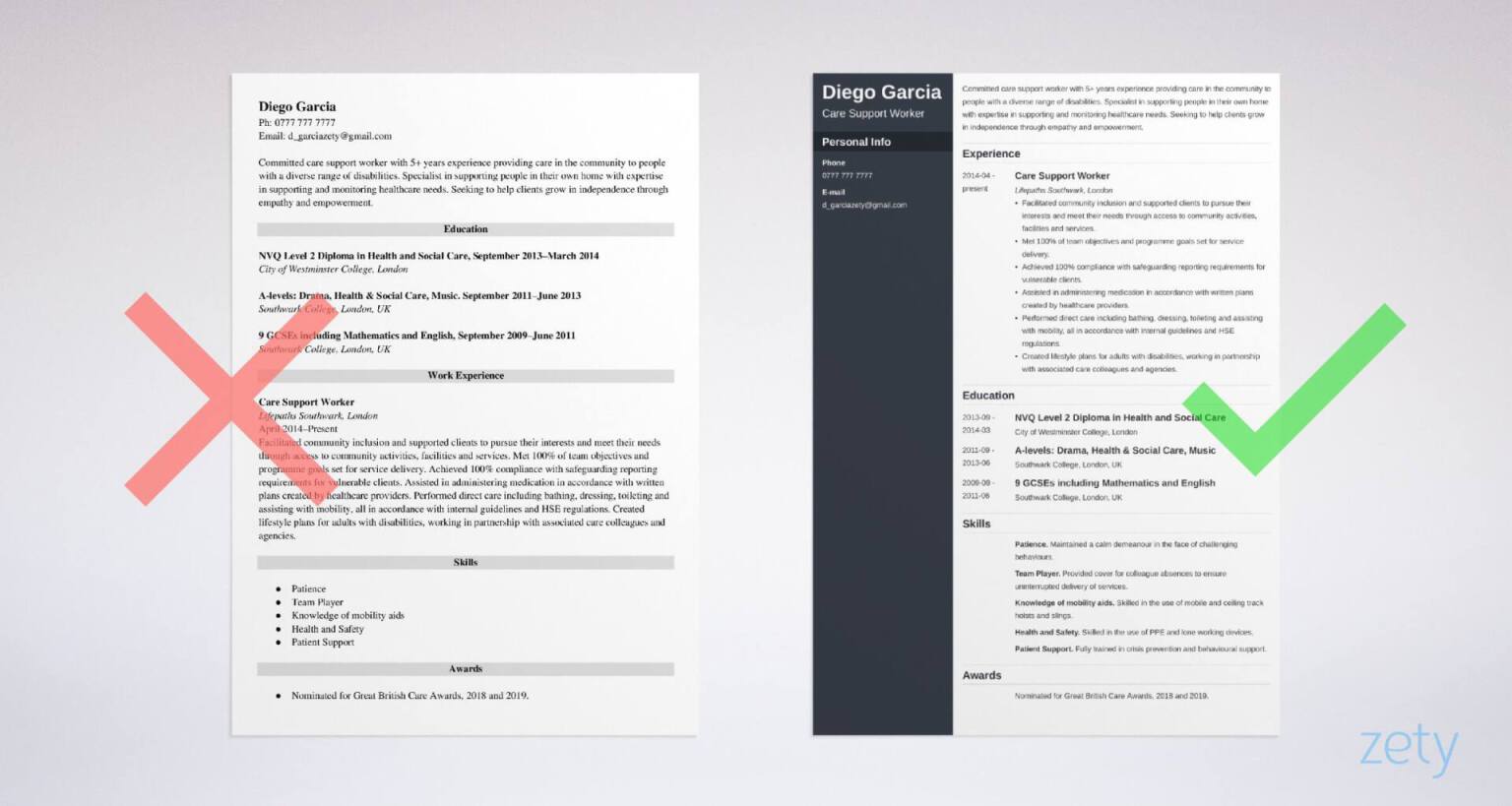Support Worker CV: Examples & Writing Guide for 2026
Create your CV nowBeing a support worker means being there for others—lifting them up, helping them thrive, and making a real difference every day. It’s rewarding, meaningful, and often tough work. But when it’s time to focus on your own goals you need a CV that works just as hard as you do.
Whether you're supporting someone with learning disabilities, mental health needs, or day-to-day independence, this guide will help you create a CV that reflects your compassion, experience, and skills.
Here’s what you’ll find in this guide:
- A professional support worker CV example you can adapt to your own experience
- Step-by-step help to structure and write each section of your CV
- Tips to help you stand out in a care-focused field
Want to save time and have your CV ready in 5 minutes? Try our CV builder. It’s fast and easy to use. Plus, you’ll get ready-made content to add with one click. See 20+ CV templates and create your CV here.
Support worker CV made with our builder—See more CV examples here.
Looking for other CV writing guides? Read more here:
- How to Write a CV [Professional UK Examples]
- Care Assistant CV Example & Writing Guide
- Customer Service CV Example & Writing Guide
- Retail CV Example & Writing Guide
- Waiter / Waitress CV Example & Writing Guide
- Receptionist CV Example & Writing Guide
- Hospitality CV Example & Writing Guide
- Cleaner CV Example & Writing Guide
- 20+ Free CV Templates to Download
- 18+ Creative CV Templates to Download
Sample Support Worker CV Template
Diego Garcia
Ph: 0777 777 7777
Email: d_garciazety@gmail.com
Committed care support worker with 5+ years experience providing care in the community to people with a diverse range of disabilities. Specialist in supporting people in their own home with expertise in supporting and monitoring healthcare needs. Seeking to help clients grow in independence through empathy and empowerment.
Work Experience
Care Support Worker
Lifepaths Southwark, London
April 2014–Present
- Facilitated community inclusion and supported clients to pursue their interests and meet their needs through access to community activities, facilities and services.
- Met 100% of team objectives and programme goals set for service delivery.
- Achieved 100% compliance with safeguarding reporting requirements for vulnerable clients.
- Assisted in administering medication in accordance with written plans created by healthcare providers.
- Performed direct care including bathing, dressing, toileting and assisting with mobility, all in accordance with internal guidelines and HSE regulations.
- Created lifestyle plans for adults with disabilities, working in partnership with associated care colleagues and agencies.
Education
NVQ Level 2 Diploma in Health and Social Care, September 2013–March 2014
City of Westminster College, London
A-levels: Drama, Health & Social Care, Music. September 2011–June 2013
Southwark College, London, UK
9 GCSEs including Mathematics and English, September 2009–June 2011
Southwark College, London, UK
Skills
- Patience. Maintained a calm demeanour in the face of challenging behaviours.
- Team Player. Provided cover for colleague absences to ensure uninterrupted delivery of services.
- Knowledge of mobility aids. Skilled in the use of mobile and ceiling track hoists and slings.
- Health and Safety. Skilled in the use of PPE and lone working devices.
- Patient Support. Fully trained in crisis prevention and behavioural support.
Awards
- Nominated for Great British Care Awards, 2018 and 2019.
Now, here’s the job-winning support worker CV formula:
1. Use the Best Format for Your Support Worker CV
A support worker helps with daily tasks, offers emotional support, handles personal care, and even manages paperwork. It’s a role that’s hands-on, heart-led, and full of responsibility.
In truth, it’s a job that’s impossible to describe in a couple of sentences, but the purpose of your support worker CV is to demonstrate your abilities in a way that’ll impress employers. Here’s how to do it:
- Stick to the chronological CV format. It’s the one hiring managers expect, and it highlights your relevant experience first, which is key in care roles.
- Use a clean layout with plenty of white space. Set one-inch margins, align text to the left, and double-space between sections to keep it easy on the eyes.
- Pick a readable font for your CV for support work. Calibri, Arial, or Helvetica in 11–12pt size is perfect—professional and accessible.
- Keep the CV length to two pages max. Be concise and prioritise the experience that matters most to the role.
- Save it as a PDF. Just like keeping your paperwork in order on the job, this preserves your formatting and ensures it looks right on any screen.
Read more about CV Layout: How to Layout a Professional CV
2. Write a Support Worker Personal Statement for Your CV
Whether you're helping someone build confidence, learn life skills, or manage daily tasks, your role is about enabling independence and promoting dignity. Your CV’s personal statement should reflect that.
What’s the goal? To give a snapshot of who you are as a support worker in 3–4 sentences. To write the best profile for your support worker CV, follow these steps:
- Start with your job title and experience level. Mention how many years you’ve worked in support roles or if you're just entering the field.
- Highlight your core strengths. Focus on skills like emotional resilience, communication, safeguarding awareness, and person-centred care.
- Mention key achievements or responsibilities. If possible, include a quantifiable result or standout moment from your work.
- Show your passion and values. Support work is about empathy—so let that come through. Emphasise commitment to dignity, inclusion, or empowerment.
- Tailor to the role or organisation. Reference what you admire about the employer or the type of care they provide.
This section is easier to write if you leave it until last. It’s better to have your experience, skills and education sections already written so you can use them for inspiration.
3. Craft a Compelling Work Experience Section
Your work experience is where you prove you’re capable, dependable, and ready to make a difference from day one. Employers don’t want to read a list of chores. They want to see that you’ve supported clients effectively, helped them reach goals, and worked well as part of a wider care team.
Here’s how to present it in a way that stands out:
- List roles in reverse-chronological order, meaning most recent one goes first.
- Include the job title, employer, dates (e.g. Jan 2021–Present), and up to six bullet points per role.
- Start each bullet with a strong action verb like supported, enabled, promoted, advocated.
- Rather than simply stating what you did, show how well you did it. Use accomplishment statements and the PAR (Problem Action Result) method to bring your experience to life.
- Use the job advert like a checklist. If it asks for experience in mental health, personal care, or report writing, reflect that in your bullet points. Match what they want with what you’ve already done.
Need some more hacks to create the perfect CV? Check out our guide: 20+ CV Tips and Advice for Job Application Success
4. Include an Education Section
Being a great support worker is about empathy, resilience, and real-world experience. But that's not all. Your CV should still show your educational background. Employers want to see that you meet basic requirements, especially for roles involving safeguarding, health, and specialist care.
Here's how to make the most out of it:
- Always list the name of your school, college, or university, your qualification, and dates attended. If you're still studying, include your expected completion date.
- Whether it’s a Health and Social Care diploma, NVQ, CACHE Level 2/3, or a BSc in Psychology, highlight anything that directly relates to the support role you're applying for.
- If your degree or college course covered useful topics like safeguarding, equality and diversity, or person-centred care, mention those too.
- If you lack professional experience, also add courses you took in university, your thesis title, club memberships, and other relevant activieties you took part in.
5. Show Off Your Support Worker CV Skills
A support worker's job demands a vast array of skills. But with so many to choose from, how do you decide which ones belong on your support work CV?
Follow this simple process to create a skills section that speaks directly to the hiring manager:
- Read the job advert like a care plan. It tells you exactly what the employer values—support with personal care, de-escalation experience, report writing, etc. Treat it as your blueprint.
- Make your own list. Jot down your most relevant skills from past jobs, courses, volunteering, or even personal experience. Think about what you’re proud of.
- Highlight the overlap. Those are the golden skills you need to feature. Aim for 5–10 skills, with a balance of hard skills and soft skills.
- For each skill, add a short proof point. Show how you’ve used it in action. That’s what brings your CV to life.
These skills would make a great addition to a support worker CV.
Support Worker Skills for a CV
- Compassion
- Patience
- Safeguarding skills
- Team player
- Patience
- Flexibility
- Leadership skills
- Communication skills
- Health and safety compliance
- Ability to work under pressure
- Ability to work independently
Read more: Best List of Skills to Put on a CV [Top Skills & Examples]
When making a CV in our builder, drag & drop bullet points, skills, and auto-fill the boring stuff. Spell check? Check. Start building your CV here.
When you’re done, Zety’s CV builder will score your CV and tell you exactly how to make it better.
6. Add Additional Sections to Your Support Worker CV
Once you’ve nailed the essentials, it’s time to go the extra mile. Additional sections can highlight your personality, values, and real-world experience in a way that shows you’re the right fit.
Here are some smart ways to round out your support work CV:
- Languages: Being able to speak another language can be a huge asset, especially in diverse communities or with service users whose first language isn’t English.
- Volunteering: Volunteering shows your commitment to helping others, even outside of paid work. List any roles where you supported people, worked with vulnerable groups, or contributed to community programmes.
- Certifications: Include training that goes beyond formal education.
- Technical Proficiency: Many roles now involve digital record keeping or remote collaboration. If you’ve used care management software, basic spreadsheets, or digital tools, it’s worth mentioning.
- Hobbies and Interests: Only include these if they add something meaningful. For example, hobbies that show emotional intelligence, patience, or creativity can help.
7. Attach a Support Worker Cover Letter
Skipping the cover letter is like showing up to a shift without your lanyard. In fact, nearly half of employers may reject your CV if it doesn’t include one.
But don’t panic. A great support worker cover letter doesn’t have to be long or fancy. It just has to show you care, that you understand the role, and that you’re someone they’d want on the team.
Here’s how to write a cover letter:
- Follow a clean cover letter format. Keep your layout simple, professional, and readable (think single-page cover letter length, clear paragraphs, standard font).
- Put a ‘hook’ in the opening of your support work cover letter. Be energetic and passionate, and include a compelling professional achievement.
- Use the body to show how your experience and support worker skills fit the job description. Think about how you align with the organisation’s values.
- End with a call to action. Invite them to get in touch. Be confident but polite.
Finally, if you have no reply after a week, check back with the employer about the status of your application. It’s one of the simplest ways of improving your chances of success. 22% of hiring managers would be less likely to hire candidates who don’t follow-up.
Plus, a great cover letter that matches your CV will give you an advantage over other candidates. You can write it in our cover letter builder here. Here's what it may look like:
See more cover letter templates and start writing.
About Zety’s Editorial Process
Our editorial team has thoroughly reviewed this article to ensure it follows Zety’s editorial guidelines. Our dedication lies in sharing our expertise and providing you with actionable career advice that offers you real value. Every year, the quality of our content attracts 40 million readers to our site. But that’s not all – we conduct original research to gain a detailed understanding of the labour market. We take pride in being cited by top universities and leading media outlets in the UK and worldwide.





![What to Include in a Cover Letter for a Job [15+ Examples]](https://cdn-images.zety.com/pages/what_to_include_in_a_cover_letter_2.jpg?fit=crop&h=250&dpr=2)
